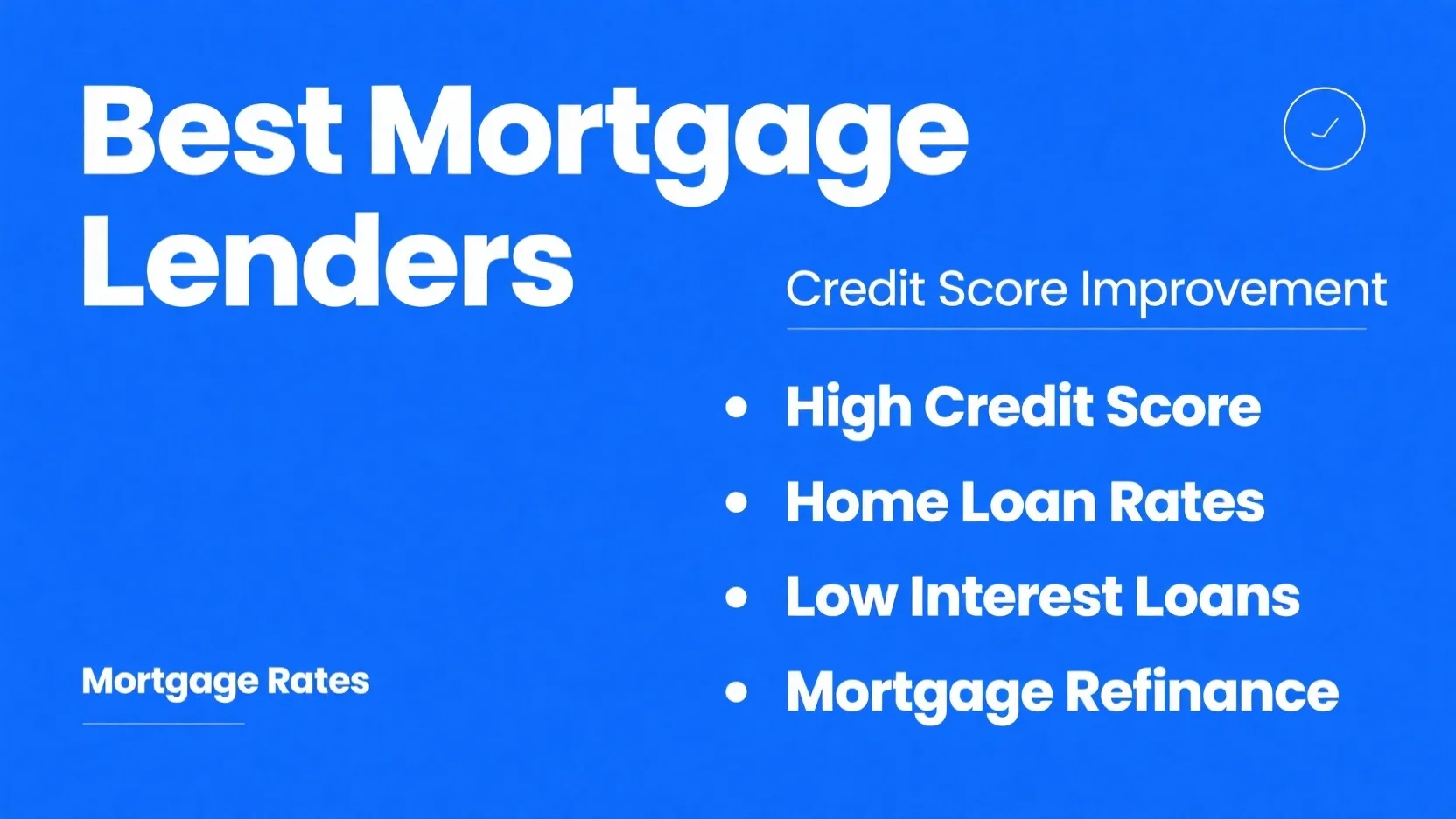
Explore the Best Mortgage Rates for High Credit Scores in 2025

Image Source: pexels
Borrowers with great credit scores can learn how to lower mortgage interest rates with good credit, as they typically receive the best mortgage rates. Lenders view them as low-risk, resulting in lower rates and fees. To achieve low mortgage rates, it’s essential to select favorable loans, compare lenders, and maintain sound financial habits to secure the best offers.
Key Takeaways
- Great credit scores mean lower home loan rates. Scores above 760 get top deals.
- It’s important to compare lenders. Small rate changes can save lots of money later.
- Knowing loan types helps you pick better. Regular, FHA, VA, and Jumbo loans have different pros and cons.
Current Mortgage Rate Trends for High Credit Scores
National Average Rates in 2025
Mortgage rates in 2025 are higher than past averages. People with high credit scores get better rates. However, the market still has generally high rates. Experts think rates will stay near 6% by year-end. Some predict rates between 5.75% and 7.25%. For example, the Mortgage Bankers Association expects 6.4%, while Realtor.com predicts slightly over 6%.
The table below shows average mortgage APRs for FICO score ranges in 2025:
| FICO Score | Mortgage APR |
|---|---|
| 760-850 | 7.242% |
| 700-759 | 7.449% |
| 680-699 | 7.555% |
| 660-679 | 7.609% |
| 640-659 | 7.711% |
| 620-639 | 7.838% |
Borrowers with scores over 760 get the best rates. Lower scores mean higher costs.
Rate Variations by Loan Type
Mortgage rates change depending on the loan type. High credit score borrowers have several choices:
- Conventional loans : These loans have good rates but may cost more than government-backed loans.
- FHA loans : These loans often have lower rates, great for first-time buyers.
- VA loans : These loans usually have the lowest rates and need no down payment. They are perfect for veterans.
- Jumbo loans : These loans are for expensive homes and may have higher rates due to risk.
Knowing these options helps borrowers pick the right loan for their needs.
Credit Score Tiers and Their Impact on Rates
Credit score levels greatly affect mortgage rates. Lenders use these levels to decide risk. Higher scores mean lower rates. The table below shows how rates differ by FICO score:
| FICO Score | Mortgage APR |
|---|---|
| 760-850 | 7.242% |
| 700-759 | 7.449% |
| 680-699 | 7.555% |
| 660-679 | 7.609% |
| 640-659 | 7.711% |
| 620-639 | 7.838% |
People with scores above 760 get the lowest rates. Those with lower scores pay more. Keeping a high credit score is key to getting good rates.
Factors That Affect Mortgage Rates for High Credit Scores
How Credit Scores Change Mortgage Rates
Credit scores are very important for mortgage rates. A high score shows lenders you are less risky. This often means lower interest rates. People with scores over 760 get the best rates. Lenders adjust rates based on your credit score. For example, a score of 620 gets higher rates than 780. Keeping your credit score high helps you get lower rates.
Loan Types and Their Effect on Rates
Different loans have different rates, even for great credit. Conventional loans have good rates but need bigger down payments. FHA loans are for first-time buyers and have lower rates but need extra insurance. VA loans are for veterans, with the lowest rates and no down payment. Jumbo loans are for expensive homes and may have higher rates. Knowing these loans helps you pick the best one for your needs.
Other Things: Down Payments, Loan Terms, and Market Trends
Other things also change mortgage rates. Bigger down payments lower lender risk and can get better rates. Shorter loans, like 15 years, have lower rates but higher monthly costs. In 2025, rates are higher because of inflation and Federal Reserve actions. People with high credit scores still get better rates, but all borrowers pay more than before.
Best Mortgage Options for High Credit Score Borrowers
Conventional Loans: Pros and Cons
Conventional loans are common for people with high credit scores. They have benefits like lower interest rates and flexible terms. With great credit, you might skip mortgage insurance or pay less for it. But there are downsides too. These loans need higher credit scores and bigger down payments. Closing costs can also be more expensive than other loans.
| Pros of Conventional Loans | Cons of Conventional Loans |
|---|---|
| Lower interest rates | Need higher credit scores |
| Flexible loan terms | May require mortgage insurance |
| Reduced or no mortgage insurance costs | Higher closing costs |
FHA Loans: Pros and Cons
FHA loans are good for people with lower credit scores. But they can also help those with excellent credit. These loans have slightly lower interest rates but need lifetime mortgage insurance. In January 2025, the average FHA loan rate was 7.12%, while conventional loans averaged 7.16%. People with high credit scores may prefer conventional loans. They allow canceling mortgage insurance after reaching 20% equity.
- FHA loans work for lower credit score borrowers.
- Conventional loans are better for high credit score borrowers.
- FHA loans need lifetime mortgage insurance, unlike conventional loans.
VA Loans: Pros and Cons
VA loans are great for veterans and active military members. They let you buy a home without needing a down payment. VA loans also have low interest rates, saving you money. You don’t need Private Mortgage Insurance (PMI), which lowers monthly payments. However, only eligible veterans or military members can use these loans.
- No down payment is needed.
- Low interest rates save money.
- No PMI means lower monthly payments.
Jumbo Loans: Pros and Cons
Jumbo loans are for buying expensive homes above regular loan limits. These loans need higher credit scores and bigger down payments. If you have excellent credit, you might get good rates. But because of the larger loan size, interest rates can still be higher. Jumbo loans are best for luxury homes but have stricter rules.
- Good for buying expensive homes.
- Need higher credit scores and down payments.
- Interest rates may be higher due to bigger risks.
People with high credit scores should think carefully about these choices. Knowing how to lower mortgage interest rates with good credit can help them get better deals.
Top Lenders for High Credit Score Borrowers in 2025

Image Source: pexels
Best Lenders for Competitive Rates
People with high credit scores want lenders with great rates. In 2025, lenders like Guaranteed Rate and Loan Depot are popular. They offer special loans and good prices for top credit borrowers. Things like home prices and mortgage insurance affect monthly payments. This is especially true in expensive areas. Fixed-rate loans give steady payments, while adjustable-rate loans start lower. Knowing your credit score and down payment helps you get better deals.
Comparing Lender Features and Benefits
Lenders have different features and perks. Guaranteed Rate has an easy online application for tech-friendly users. Loan Depot offers good rates and personal customer service. Look at extras like rate locks, flexible payments, or help with closing costs. Comparing these options helps you pick the best lender for your needs.
| Lender | Key Features | Ideal For |
|---|---|---|
| Guaranteed Rate | Easy online process, great rates | Tech-savvy buyers |
| Loan Depot | Friendly service, flexible terms | First-time buyers |
Drawbacks to Consider When Choosing a Lender
Top lenders have good rates but may have downsides. Some charge higher fees or need stricter qualifications. Others might not offer flexible terms or good support. Check for hidden fees or penalties before choosing. Picking a lender that fits your needs can help you save money and get better rates.
How to Lower Mortgage Interest Rates with Good Credit
Boost and Keep a High Credit Score
Having a high credit score helps you get the best rates. Here are ways to improve your score before applying for a loan:
- Look for mistakes in your credit report and fix them.
- Pay off credit cards to keep usage under 30%.
- Always pay bills on time since it affects your score.
- Don’t open new credit accounts to avoid hard checks.
- Ask for higher credit limits but don’t spend more.
- Clear old debts and collections to look more reliable.
A better credit score saves you money. For example, someone with a 750 score might get a 3.5% rate. But a 650 score could mean a 4.5% rate. That 1% difference can save thousands over the loan’s life.
Compare Lenders and Their Offers
People with good credit should check offers from many lenders. Comparing rates can save you a lot of money each year. For instance, Freddie Mac found comparing two lenders saved 0.1% on rates. In 2022, this savings grew to 20 basis points due to higher rates. Checking multiple lenders helps you find the best deal for your needs.
Know APR and Interest Rates
Knowing the difference between APR and interest rates is important. The interest rate shows borrowing costs, while APR includes extra fees. APR gives a full picture of loan costs. This helps you pick the most affordable mortgage. Choosing wisely can help you reach long-term money goals.
Get Pre-Approved for a Loan
Getting pre-approved shows lenders you’re ready to buy. It also helps you know your budget and possible rates. Pre-approval makes you a stronger buyer and can get you better terms. Lenders see pre-approved buyers as serious, which may lead to faster approval and lower rates.
Great credit scores help you get the best mortgage rates. Borrowers should check lenders and loans to fit their goals.
Paying more upfront and having less debt can improve loan terms.
Improving credit, comparing lenders, and learning about loans can get better rates.
FAQ
What loan is best for people with high credit scores?
Conventional loans are great for people with high credit scores. They have lower rates, flexible options, and may skip mortgage insurance.
How does having a high credit score help with mortgage rates?
A high credit score shows lenders you’re less risky. Scores over 760 often get the lowest rates and save money over time.
Should people with high credit scores still check different lenders?
Yes, checking lenders helps find the best rates and terms. Even small rate changes can save a lot of money over the loan’s life.
